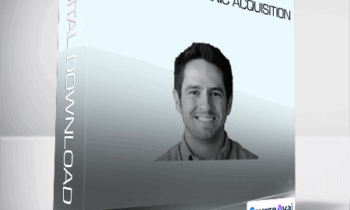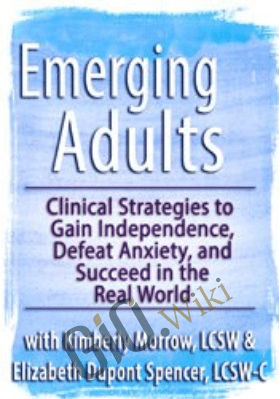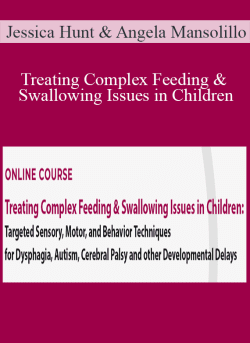Stephen Porges & Deb Dana – Clinical Applications of Polyvagal Theory in Trauma Treatment with Stephen Porges & Deb Dana: Integrating the Science of Safety, Trust, Self-Regulation and Attachment
Original price was: $199.00.$59.00Current price is: $59.00.
In StockDigital Download: You will receive a download link via your order email
Save up to 85% compared to Salepage prices. In addition, earn additional points. Save more on your next order.
Please contact email: [email protected] if you have any questions about this course.
Description
Accelerate your learning with the Stephen Porges & Deb Dana – Clinical Applications of Polyvagal Theory in Trauma Treatment with Stephen Porges & Deb Dana: Integrating the Science of Safety, Trust, Self-Regulation and Attachment course, priced at just Original price was: $199.00.$59.00Current price is: $59.00. on ESYSGB.com! Explore our extensive catalog of over 60,000 downloadable digital courses across Health and Medical. Experience flexible, self-paced learning from experts and save over 80%. Empower your future today!
![Stephen Porges & Deb Dana – Clinical Applications of Polyvagal Theory in Trauma Treatment with Stephen Porges & Deb Dana: Integrating the Science of Safety, Trust, Self-Regulation and Attachment - eSys[GroupBuy] Stephen Porges & Deb Dana - Clinical Applications of Polyvagal Theory in Trauma Treatment with Stephen Porges & Deb Dana1](https://esysgb.com/wp-content/uploads/2022/08/Stephen-Porges-Deb-Dana-Clinical-Applications-of-Polyvagal-Theory-in-Trauma-Treatment-with-Stephen-Porges-Deb-Dana1.jpg) Stephen Porges & Deb Dana – Clinical Applications of Polyvagal Theory in Trauma Treatment with Stephen Porges & Deb Dana: Integrating the Science of Safety, Trust, Self-Regulation and Attachment
Stephen Porges & Deb Dana – Clinical Applications of Polyvagal Theory in Trauma Treatment with Stephen Porges & Deb Dana: Integrating the Science of Safety, Trust, Self-Regulation and Attachment
Scientific evidence reveals how to help your clients feel safe enough to get to the REAL issues so they can finally heal from trauma, depression, addiction and other mental health challenges
Traumatic events rewire your clients’ nervous system—keeping the autonomic nervous system (ANS) in a constant physiological state that supports fear and defense. This can make them easily agitated, always scanning the environment for signs of danger, or numb and completely shut off from the world.
When the nervous system is in self-protection mode, your clients are physically incapable of feeling safe, connecting with others or healing mental and physical wounds, which compounds their suffering.
You can help them find their way back to safety by leveraging the revolutionary tools and insight from the Polyvagal Theory.
Polyvagal Theory Helps You Complete the First—and Most Crucial—Treatment Step: Creating a Sense of Safety With Your Clients
Without first helping your clients come to a place of safety, you won’t be able to help your clients heal…
Which means they will continue to suffer, day after day.
This new online course will give you what you need to add Polyvagal Theory to your therapy practice…
So you can truly help your clients overcome the impact of trauma, anxiety, ADHD, addiction, depression and other mental health conditions.
Polyvagal Theory: Better living through neurobiology
Polyvagal Theory is a brain-body science that’s helped thousands of therapists make significant breakthroughs with clients suffering the impacts of trauma.
It provides scientific evidence—and the tools—to establish safe, caring, stable and mutually trustworthy relationships with clients.
Polyvagal Theory helps to explain why clients get stuck in either a hyper-aroused or hypo-aroused state post-trauma—and gives you a roadmap to help them return to a place of calm and safety…
And it can be embedded into any clinical treatment method you use in your practice, including:
- IFS
- CBT
- DBT
- ACT
- EMDR
- And more!
In this online course, you’ll learn the principles and practical applications of Polyvagal Theory from the most qualified experts on the topic: Dr. Stephen Porges and Deb Dana.
There is no better teacher of Polyvagal Theory than the founder himself, Dr. Stephen Porges. And Deb Dana is the best teacher of the clinical application of the theory, as she’s widely credited with adapting Polyvagal Theory to trauma treatment.
From their work, Polyvagal Theory now informs many innovative treatments, especially in trauma.
Get practical guidance into the therapeutic power of facial expression, eye contact, voice modulation and listening to help your clients overcome traumatic experiences, attachment wounds and barriers to self-regulation.
Polyvagal Theory is an excellent practice addition for:
- Counselors
- Social Workers
- Psychologists
- Case Managers
- Addiction Counselors
- Marriage and Family Therapists
- Nurses, and
- Other Mental Health Professionals
Discover why leading therapy experts including Bessel van der Kolk, Janina Fisher, Pat Ogden, Rick Hanson, and others have integrated this insight into their work.
WHAT YOU’LL DISCOVER IN THIS COURSE
PART ONE: Clinical Applications of the Polyvagal Theory with Stephen Porges, PhD: Trauma, Attachment, Self-Regulation & Emotions
SECTION I: The Neurobiology of Connection, Trust and Safety
Why Connection is Crucial to Our Survival
- The building blocks of healthy relationships
- The 2 phases of co-regulation and how to use them in your practice
- How safety optimizes the human experience
- How trauma disrupts both connectedness and co-regulation
Polyvagal Theory: The Adaptive Function of Evolutionary Changes in the Autonomic Nervous System (ANS)
- Origins of Polyvagal Theory
- Immobilization with fear vs. immobilization without fear
- The vagal paradox: Discovering a lost defense system
- How the evolution of the nervous system impacts our emotional reactions to trauma
- How your clients’ autonomic state reveals a window and target for intervention
- Predictable health consequences of a dysregulated ANS
SECTION II: Breakdown of Polyvagal Theory into Its Usable Parts
Principles of Polyvagal Theory
- The Social Engagement System in promoting connectedness, trust, play and intimacy
- Deconstructing the Social Engagement System for greater understanding of how the ANS regulates itself
- The embedded optimism of Polyvagal Theory
- The Face-Heart Connection: Why facial expressions reflect a person’s polyvagal state
- How some physical conditions—and Botox—negatively impact the Social Engagement System
- Neuroception and the unconscious assessment of safety and risk
SECTION III: Applying the Polyvagal Theory in Clinical Settings
Using Vocal Music and Voice in Healing Trauma
- How the detached middle ear in mammals is a key component of a well-regulated ANS
- How to speed up healing by incorporating music and vocalizations in your practice
- The importance of active listening in a Polyvagal Theory-informed practice
Simple Ways to Incorporate Polyvagal Theory into Your Existing Practice
- How the principles to establish therapeutic relationships are like play
- Portals for neural exercises in Polyvagal Theory-informed therapy (play, singing, breathing exercises, etc.)
- How to create an environment of safety for your clients that encourages trust
- Recovering the Social Engagement System in clients experiencing shutdown
- How to incorporate the Safe and Sound protocol into your practice
- The new paradigm of Polyvagal Theory-Informed clinical practice
PART TWO: Deb Dana on Polyvagal Theory Informed−Trauma Assessment and Interventions: An Autonomic Roadmap to Safety, Connection and Healing
SECTION I: Understanding the Principles, Science and Foundations of Polyvagal Theory
Evolution of the autonomic nervous system (ANS)
- The impact of trauma on the ANS
- Benefits of autonomic flexibility
- Risks connected to autonomic rigidity
- Creating a healing environment by listening to your ANS
The Three Organizing Principles of Polyvagal Theory
- Neuroception: How the unconscious scanning of the ANS for clues of danger or safety affects traumatized clients
- Hierarchy: Three predictable pathways of response
- Co-regulation: The biological imperative of connection
What Is the Vagus Nerve and What Role Does It Play in Regulating the ANS
- The vagal paradox
- The ventral vagus nerve
- The dorsal vagus nerve
- The vagal brake
- How to find ventral vagal anchors that help activate feelings of social engagement and safety
SECTION II: Processes to Help Move from Dysregulation to Regulation
Tools You Can Use in Polyvagal Theory−Informed Therapy
- Savoring
- The 4 R’s
- Notice and Name
- The Autonomic Ladder
- The Personal Profile Map
- And many more!
How to Identify Blended States
- State of Play
- State of Stillness
The Social Engagement System
- What it is and why it’s essential to understanding Polyvagal Theory—and your clients
- How to engage the 5 elements of the Social Engagement System
- Using and exercising the Social Engagement System to regulate states in your clients
SECTION III: Creating Polyvagal Theory−Informed Trauma Treatment for Your Clients
Helping your Clients Orient Themselves Prior to Treatment
- Helping your clients determine “foreground” and “background” ANS signals
- A simple touch you can use to activate clients’ ventral vagal system
- How to help your clients identify the “triggers” and “glimmers” of their ANS
- How to use your voice to create an environment of safety for your clients
Deep Dive into Using Co-Regulation with Your Clients
- Tools to help you regulate your own autonomic state to create an environment of safety for your clients
- Understanding “biological rudeness” and the cycle of reciprocity, rupture and repair
- Resources and worksheets for regulation, including coordinated movement and breathing exercises, mirroring, and more
- What to do if you can’t make a positive nervous system connection with a client
The Flow of a Polyvagal Theory-Informed Session
- How to assess for patterns in clients’ autonomic states to better inform treatment planning
- How to regulate and reshape your client’s autonomic state
- Putting all the tools together to create productive, successful sessions with clients
- The one question that must guide your sessions
- The phases of trauma work, from a Polyvagal Theory perspective
- Understanding the responsibilities of a Polyvagal Theory-guided therapist
- Creating a launch plan for your Polyvagal Theory-guided practice
Meet the Course Experts:
![twxszow9l0gwrmo3hj5bww - eSys[GroupBuy]](https://esysgb.com/wp-content/uploads/2024/01/twxszow9l0gwrmo3hj5bww.jpg)
Stephen W. Porges, PhD, is Distinguished University Scientist at Indiana University, where he is the founding director of the Traumatic Stress Research Consortium within the Kinsey Institute. He holds the position of Professor of Psychiatry at the University of North Carolina and Professor Emeritus at the University of Illinois at Chicago and the University of Maryland.
Dr. Porges served as president of both the Society for Psychophysiological Research and the Federation of Associations in Behavioral & Brain Sciences and is a former recipient of a National Institute of Mental Health Research Scientist Development Award. He has published more than 300 peer reviewed scientific papers across several disciplines including anesthesiology, biomedical engineering, critical care medicine, ergonomics, exercise physiology, gerontology, neurology, neuroscience, obstetrics, pediatrics, psychiatry, psychology, psychometrics, space medicine, and substance abuse.
In 1994 Dr. Porges proposed the Polyvagal Theory, a theory that links the evolution of the mammalian autonomic nervous system to social behavior and emphasizes the importance of physiological state in the expression of behavioral problems and psychiatric disorders. The theory is leading to innovative treatments based on insights into the mechanisms mediating symptoms observed in several behavioral, psychiatric, and physical disorders.
He is the author of The Polyvagal Theory: Neurophysiological foundations of Emotions, Attachment, Communication, and Self-regulation (Norton, 2011), The Pocket Guide to the Polyvagal Theory: The Transformative Power of Feeling Safe (Norton, 2017) and co-editor of Clinical Applications of the Polyvagal Theory: The Emergence of Polyvagal-Informed Therapies (Norton, 2018).
Dr. Porges is also the creator of a music-based intervention, the Safe and Sound Protocol™, which currently is used by more than 1000 therapists to improve spontaneous social engagement, to reduce hearing sensitivities, and to improve language processing, state regulation, and spontaneous social engagement.
Click here for information about Stephen Porges.
![3ebpjcqqe0y0euzghusuga 3ebpjcqqe0y0euzghusuga - eSys[GroupBuy]](https://esysgb.com/wp-content/uploads/2024/01/3ebpjcqqe0y0euzghusuga.jpg)
Deb Dana, LCSW, specializes in treating complex traumatic stress and lectures internationally on the ways Polyvagal Theory informs clinical interactions with trauma survivors. She is a consultant to the Traumatic Stress Research Consortium in the Kinsey Institute at Indiana University and the developer of the Rhythm of Regulation clinical training series.
Deb is the author of The Polyvagal Theory in Therapy: Engaging the Rhythm of Regulation (Norton, 2018), Polyvagal Exercises for Safety and Connection: 50 Client-Centered Practices (Norton, 2020), developer of the Polyvagal Flip Chart (Norton 2020) and co-editor with Stephen Porges, of Clinical Applications of the Polyvagal Theory: The Emergence of Polyvagal-Informed Therapies (Norton, 2018). Deb received her B.A. in social welfare and her M.S.W., both from the University of Southern Maine.
She is trained in Internal Family Systems, Tapas Acupressure Technique, and Sensorimotor Psychotherapy. She completed the certificate program in traumatic stress studies at the Trauma Center. To learn more about Deb’s work
Sale Page: https://catalog.pesi.com/sales/bh_c_001341_polyvagaltheory_organic-102244
Archive: https://archive.fo/qJAK9
Delivery Method
– After your purchase, you’ll see a View your orders link which goes to the Downloads page. Here, you can download all the files associated with your order.
– Downloads are available once your payment is confirmed, we’ll also send you a download notification email separate from any transaction notification emails you receive from Forimc.me.
– Since it is a digital copy, our suggestion is to download and save it to your hard drive. In case the link is broken for any reason, please contact us and we will resend the new download link.
– If you cannot find the download link, please don’t worry about that. We will update and notify you as soon as possible at 8:00 AM – 8:00 PM (UTC+8).
Thank You For Shopping With Us!
Be the first to review “Stephen Porges & Deb Dana – Clinical Applications of Polyvagal Theory in Trauma Treatment with Stephen Porges & Deb Dana: Integrating the Science of Safety, Trust, Self-Regulation and Attachment” Cancel reply
Build a robust future with the Stephen Porges & Deb Dana – Clinical Applications of Polyvagal Theory in Trauma Treatment with Stephen Porges & Deb Dana: Integrating the Science of Safety, Trust, Self-Regulation and Attachment course at ESYSGB.com! Gain lifetime access to high-impact digital content, meticulously designed to boost your career and personal growth.
- Lifetime Access: Permanent and unlimited access to your purchased courses.
- Exceptional Savings: Enjoy discounts of up to 80% off original prices.
- Secure Payments: Your transactions are fully protected and safe.
- Practical Knowledge: Acquire actionable skills for immediate application.
- Instant Availability: Start learning right after completing your purchase.
- Cross-Device Access: Study seamlessly on any desktop, tablet, or mobile device.
Unlock your potential with ESYSGB.com!












![Stephen Porges & Deb Dana – Clinical Applications of Polyvagal Theory in Trauma Treatment with Stephen Porges & Deb Dana: Integrating the Science of Safety, Trust, Self-Regulation and Attachment - eSys[GroupBuy] Stephen Porges & Deb Dana – Clinical Applications of Polyvagal Theory in Trauma Treatment with Stephen Porges & Deb Dana: Integrating the Science of Safety, Trust, Self-Regulation and Attachment](https://esysgb.com/wp-content/uploads/2024/01/Stephen-Porges-Deb-Dana-Clinical-Applications-of-Polyvagal-Theory-in-Trauma-Treatment-with-Stephen-Porges-Deb-Dana-250x343-1.png)


![Lane Pederson - DBT in Action: In-Session Client Demonstration - eSys[GroupBuy] Lane Pederson - DBT in Action: In-Session Client Demonstration](https://esysgb.com/wp-content/uploads/2023/04/Lane-Pederson-DBT-in-Action-In-Session-Client-Demonstration.png)
![Jose F. Vasquez - Advance Your Cultural Competency in the Clinical Setting: DSM-5® Guidelines, Ethical Standards and Multicultural Awareness - eSys[GroupBuy] Jose F. Vasquez - Advance Your Cultural Competency in the Clinical Setting: DSM-5® Guidelines](https://esysgb.com/wp-content/uploads/2023/04/Jose-F.-Vasquez-Advance-Your-Cultural-Competency-in-the-Clinical-Setting-DSM-5®-Guidelines-Ethical-Standards-and-Multicultural-Awareness.png)
![Paul Brasler - Certified Addictions-Informed Mental Health Professional (CAIMHP): Two-Day Intensive Competency Training - eSys[GroupBuy] Paul Brasler - Certified Addictions-Informed Mental Health Professional (CAIMHP): Two-Day Intensive Competency Training](https://esysgb.com/wp-content/uploads/2023/04/Paul-Brasler-Certified-Addictions-Informed-Mental-Health-Professional-CAIMHP-Two-Day-Intensive-Competency-Training.png)
![Jamie Miner - 3-Day: Vestibular Rehabilitation Intensive Training Course - eSys[GroupBuy] Jamie Miner - 3-Day: Vestibular Rehabilitation Intensive Training Course](https://esysgb.com/wp-content/uploads/2023/04/Jamie-Miner-3-Day-Vestibular-Rehabilitation-Intensive-Training-Course.png)
![Michael Mirdad - You're Not Going Crazy...You're Just Waking Up! - eSys[GroupBuy] Michael Mirdad - You're Not Going Crazy...You're Just Waking Up!](https://esysgb.com/wp-content/uploads/2023/04/Michael-Mirdad-Youre-Not-Going-Crazy.Youre-Just-Waking-Up.png)
![Mary Asper - Dyslexia, Dyscalculia and Dysgraphia - eSys[GroupBuy] Mary Asper - Dyslexia](https://esysgb.com/wp-content/uploads/2023/04/Mary-Asper-Dyslexia-Dyscalculia-and-Dysgraphia.png)

Reviews
There are no reviews yet.